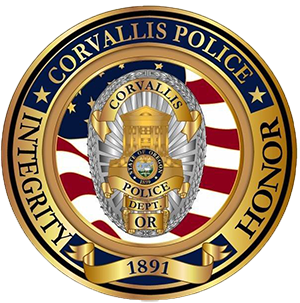Police Department General Resources
Accreditation (CALEA)
The Corvallis Police Department became nationally accredited in 1995 through the Commission on Law Enforcement Accreditation, Inc. (CALEA). Following a comprehensive on-site inspection of policies, procedures, and operations in December 2011, the Corvallis Police Department was officially re-accredited on March 21, 2012. Visit this web site for more information about law enforcement accreditation.
Benton County Sheriff's Office
The Benton County Sheriff's Office and Corvallis Police Department work together closely on the Major Crimes Team and Street Crimes Unit. Visit this web site to learn more about the Sheriff's Office.
Benton County's Sex Offender Notification Program
Visit this web site for photos and information about sex offenders in Benton County.
DPSST Western Regional Community Policing Resource and Training Center
This Center provides a wealth of resources to more than 826 agencies across eight states. The Executive Steering Committee's purpose is to represent the interests, concerns, and needs of the state public safety training centers, and citizens of their respective states in determining and accomplishing the mission, goals, and desired outcomes of the Center. The Committee also serves as a catalyst for community policing, and a conduit for providing information, resources, and support to their constituents.
National Center for Missing and Exploited Children
As the nation's resource center for child protection, the National Center for Missing and Exploited Children (NCMEC) spearheads national efforts to locate and recover missing children and raises public awareness about ways to prevent child abduction, molestation, and sexual exploitation. A private, nonprofit organization established in 1984, NCMEC operates under a Congressional mandate and works in conjunction with the U.S. Department of Justice's Office of Juvenile Justice and Delinquency Prevention
Federal Bureau of Investigation (FBI)
The FBI is a field-oriented organization in which FBI Headquarters in Washington, D.C., provides program direction and support services to 56 field offices, 400 satellite offices, four specialized field installations, and more than 40 foreign liaison posts. The priorities for the FBI are to protect the United States from terrorist attacks, espionage, foreign intelligence operations, cyber-based attacks and high technology crimes, corruption at all levels.
Central Intelligence Agency (CIA)
The CIA's mission is to support the President, the National Security Council, and all officials who make and execute the U.S. national security policy. The CIA engages in research development, and deployment of high-leverage technology for intelligence purposes. As a separate agency, the CIA serves as an independent source of analysis on topics of concern and also works closely with the other organizations in the Intelligence Community to ensure that the intelligence consumer-whether Washington policymaker or battlefield commander-receives the best intelligence possible.
Centers for Disease Control and Prevention
CDC works hard to make people safer and healthier. By charting decisive courses of action, collecting the right information, and working closely with other health and community organizations, CDC has been putting science into action to tackle important health problems since 1946. The CDC plays a critical role in protecting the public from the most widespread, deadly and mysterious threats against our health today and tomorrow.
